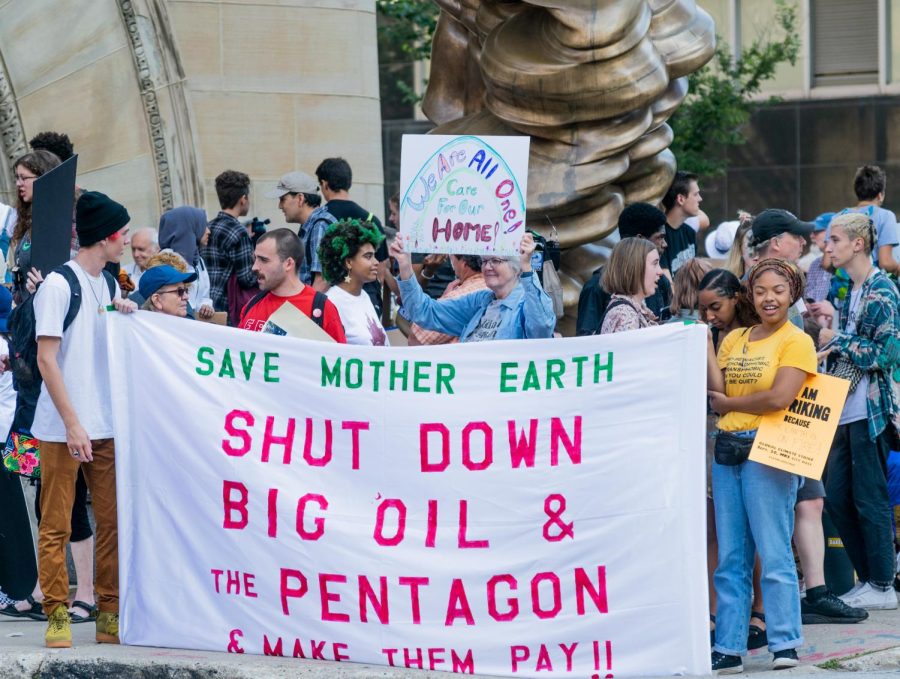For the second year in a row, Marquette has received a grade of C+ for its sustainability efforts, according to a report card released by the Sustainable Endowments Institute.
The report, released earlier this month, evaluates universities’ commitments to environmental sustainability based on responses to survey questions. Letter grades are assigned in nine categories.
This is the fourth year the reports have been released. Marquette has never received above a C grade, which has not gone unnoticed by students.
The MU=E2 group — Marquette University equals Environmentally Efficient — was born out of a Political Organizations course this year, said Margaret Peterson, head of the group’s media committee.
The impetus for the group’s formation was last year’s mediocre sustainability report card, she said.
MU=E2 sees itself as a lobbying organization that seeks to raise awareness of sustainability issues and push the university to focus more on environmental efficiency, said Peterson, a junior in the College of Arts & Sciences.
“We all kind of felt that Marquette could do better as a community,” Peterson said. “We should make these issues our top priority.”
She said MU=E2 doesn’t appeal to any specific campus demographic, like those who consider themselves environmentally conscious, which separates it from other environmental groups at Marquette.
“We kind of transcend these groups and have something everyone can work toward,” Peterson said.
She said one problem with the university administration’s efforts to address sustainability issues is a lack of communication with students.
“I had absolutely no idea that there was even any administrative steps being taken at all, then (university sustainability officer) Mike Whittow spoke to our class,” Peterson said.
The group is currently working on connecting with students, Peterson said. Right now, it has a Twitter account and a Facebook group with almost 250 members.
Marquette is aware of the report card grades and is constantly working to improve sustainability, Whittow said.
This year, the university’s two lowest grades were in the Climate Change & Energy and Green Buildings categories, both of which received “D” grades.
The Climate Change & Energy grade could be improved by the university making a commitment to reduce greenhouse gas emissions by a specific amount, said Susan Paykin, a communications fellow with the Sustainable Endowments Institute.
“That’s a big step that every university can take,” Paykin said.
A common way institutions try to reduce greenhouse gases is by calculating their carbon dioxide emissions, which is easier said than done, Whittow said.
“One of the hardest things to do is calculating your carbon neutrality, how much carbon your university is letting off,” he said.
The overall grade is compiled from the average of the letter grades in the nine categories, using a 4.0 scale. Each category is weighted equally.
Grades for individual categories are determined based on submitted survey responses from each of the universities.
The Green Buildings grade, the other area where Marquette received a “D,” could be improved with a formal green building policy that commits the university to the Leadership in Energy and Environmental Design model, Paykin said.
LEED buildings adhere to a specific set of standards for environmentally sustainable structures.
With one building on campus currently seeking LEED certification — McCabe Hall — and two others that are under construction — Zilber Hall and Eckstein Hall — Whittow said he thought the “D” grade was undeserved and “doesn’t really make any sense.”
Overall, the university reaction to the sustainability report is “mixed,” Whittow said.
“We’re happy with what we’re doing,” he said. “We think we’re doing better than a C+ overall in sustainability.”
He cited the recent establishment of single-stream recycling, the installation of energy-efficient LED lighting across campus and student groups like Slow Food as examples of the university’s efforts toward sustainability.
In particular, student involvement in sustainability efforts has greatly increased, he said, and students are invited to contribute ideas for sustainability improvement to the Sustainability Task Force via the university’s Web site.
“We do need to do a little bit of work, but we’re definitely improving on a monthly basis,” Whittow said.


